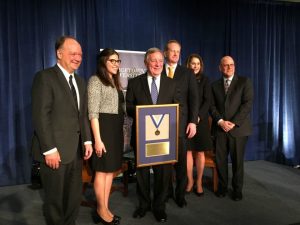This spring break, while on a Medical Brigades trip, I had the opportunity to interact with community members in the city of San Diego, Honduras. Medical Brigades is one of the programs of Global Brigades, a non-profit whose mission is “to empower volunteers and under-resourced communities to resolve global health and economic disparities and inspire all involved to collaboratively work towards an equal world.”
As a part of Medical Brigades, a group of fifty students from Georgetown traveled to Honduras in March with the goal of providing healthcare to the residents of San Diego, who lack access to medical services except for when Medical Brigades comes every three months. We worked with three clinicians, who were parents of students on the trip, as well as a team of doctors and staff members from Honduras to set up a health clinic at a local school.
Because we were dedicating our spring breaks to improving the health of other people who do not enjoy the same kinds of resources we do, I assumed we were engaging in selfless service. I thought I would enjoy the trip mainly because of the satisfying, do-good feeling that I was sure to get when helping others. I also expected that the people whom we were serving would be different from us, since they have very different lifestyles and life experiences. My interactions with them, I thought, would be different from those I have with Americans.
However, throughout the week, I noticed something: the community members in Honduras were the same as us. When a concerned mom exaggerated the severity of her son’s medical concern, I was reminded of my own mother. Teenage boys tried hard to conceal their nervousness about tooth extractions at the dentist. The kids we played soccer with everyday were like many of the kids I have met in the United States.
On service projects, there is often a tendency to dehumanize the people being served by “otherizing” them. Many times when privileged students participate in service, we (myself included) subconsciously believe that we are superior to those whom we are serving. Perhaps this is because we, the resource-providers, are the ones in power; we are wealthier, more educated, and are acting generously with our time and money. In Honduras, our scrubs signified that we students were the ones in authority, even though we don’t have much medical training. In reality, as humans, regardless of socioeconomic status, we are all the same. We just have different living situations.
A community is defined not by its resources but by its people and its culture. In San Diego, Honduras, the people and the culture are beautiful. The city’s residents welcomed us gringos, or foreigners, into their community and allowed us to take over their school to help them. They accepted, trusted, and respected us, and they treated us with kindness and gratitude.
When we serve, we are not only the givers. We are also takers, as those whom we serve also serve us in return. In Honduras, while I was helping to provide medical care to patients, I received very much in return: by spending time in the community and interacting with the patients, I learned about their country, culture, and people, and I received an overwhelming amount of respect and gratitude; meanwhile they changed me and my worldview. This story is a product of what they taught me.
Service is about forging human connections and bridging the divide between people of different backgrounds. It is about showing love and kindness towards others. Service is not simply a one-way relationship wherein a less privileged person draws benefit from a more privileged person; rather, it is a mutually-beneficial relationship in which two individuals or groups collaborate to help each other and grow together. Therefore, no party is superior or inferior to another; both are equal.
Because of the power that I did nothing to earn, I was surprised to learn that people less advantaged than me were, in fact, just like me. By connecting with people in Honduras despite the vast gulf separating their life experiences from my own, I saw that we are all basically good people with the same end goal of living happy and healthy lives. I went to Honduras with the intention of caring for others, and I came back having been cared for.
Most of us serve others not just to change, but to be changed.





